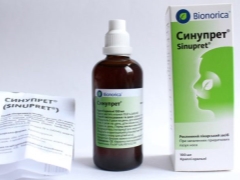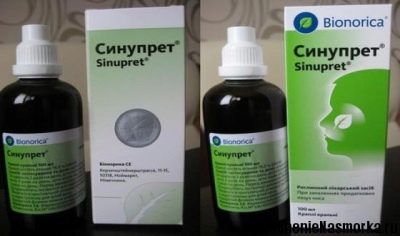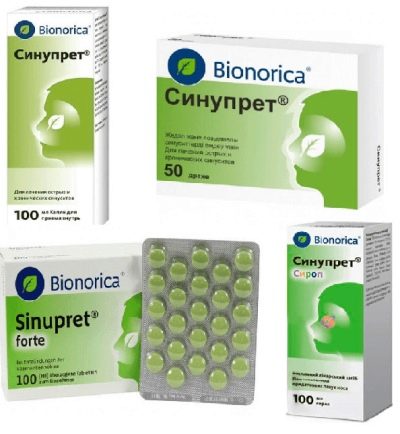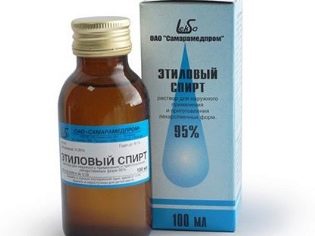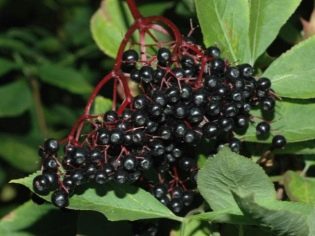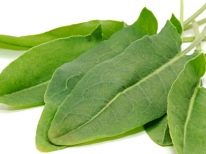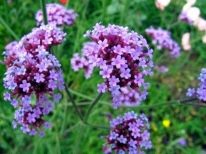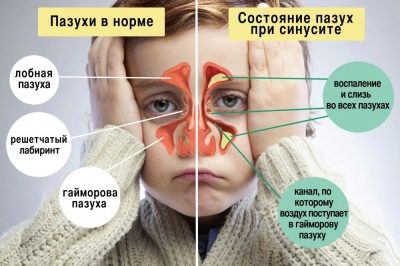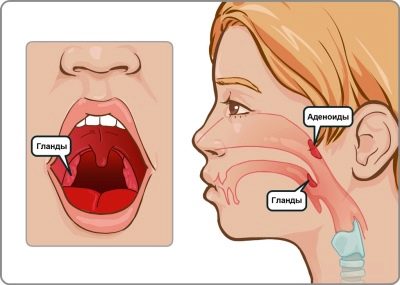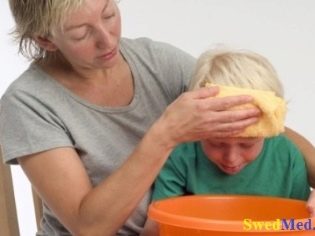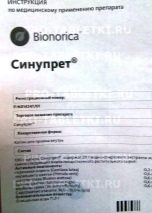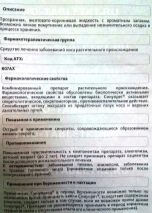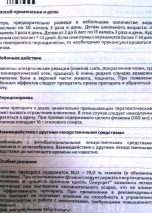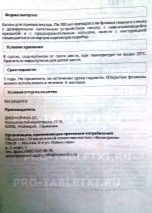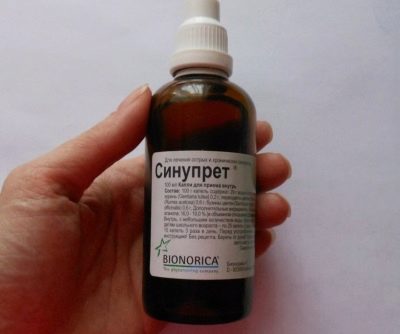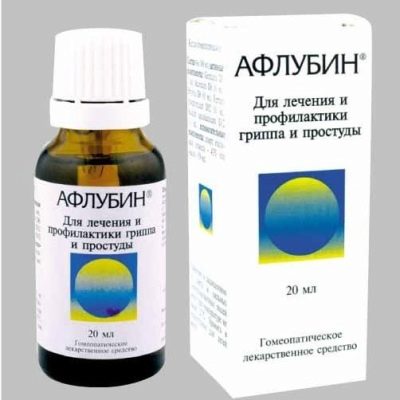Drops "Sinupret" for children: instructions for use
If the child is sick, the parents seek to apply not only effective, but also safe medicines based on natural raw materials and natural ingredients to treat them. Drops "Sinupret" are an example of the use of centuries-old knowledge about the properties of medicinal plants, enhanced by the capabilities of modern pharmaceuticals.
Release form
In pharmacies, Sinupret is sold in the form of dragees and drops, more rarely, syrup. Drops manufacturer pours in bottles of dark glass. For each bottle for convenience there is a drip device. In appearance, they are a yellowish-brown liquid with a pleasant odor.
Composition
The “Sinuret” drops include purified water, ethyl alcohol, the content of which reaches 16–19%, as well as a mixture of plant extracts from gentian root, primrose flowers, sorrel grass, elder flowers and verbena herbs. All these plants are widely used in traditional medicine for the treatment of colds, and are also used for the production of medicines.
For example, primrose, which is often called primrose in Russia, grows in almost any meadow throughout the country. Today, more than 500 species of this plant are known, including garden species. But not everyone knows that almost all of its parts - the root, stem, leaves, flowers of this plant, contain vitamins A and C, manganese salts, essential oils, flavonoids, glycosides and saponins. Thanks to them, the plant has expectorant, sedative, tonic, antispasmodic effects. In Russia, primrose was treated for coughs, colds, fevers and many other diseases.
No less often in folk recipes there are elderberry flowers, which contain glycosides, essential oil, organic acids, including ascorbic acid. Elderberry has diaphoretic, anti-inflammatory, analgesic, diuretic, and mild expectorant, and therefore has also often been used to treat colds.
Almost all 400 types of gentian have glycosides, amino acids, essential oils, vitamin C, inulin, natural sugars and other beneficial substances. The plant got its name due to the bitter taste of decoctions and extracts, which gives it more glycoside content - substances that are good for the heart. In addition to many other actions, gentian root also has anti-inflammatory and antipyretic properties.
Sorrel grass, which grows on 4 continents, including Australia, contains oxalic acid, vitamin C, proteins, sugars, carotene, quercetin. Apply sorrel in the composition of medical fees for many diseases, including colds and fevers.
And finally, verbena officinalis, known more because of its aroma, which can last even for a dry plant for many months, has also been often used in traditional medicine to treat bronchitis, sore throats, and feverish conditions. Interestingly, another name for verbena is "holy grass" or "Juno's tear".
In the composition of the drops "Sinupret" All medicinal plants enhance the action of each other, therefore the effect of the use of the medicine is faster and stronger. At the same time, there are no artificial chemical compounds in the drops, this medicine is created entirely on the basis of natural components.Ethyl alcohol plays the role of a preservative, which preserves the stability of the mixture and, consequently, the effectiveness of the drops.
Operating principle
Thanks to the natural plant extracts “Sinupret” that form part of the drops, it has an anti-inflammatory effect, has a slight bactericidal and antiviral effect, relieves swelling of the nasal mucosa and throat.
After applying it, the contents of the paranasal sinuses are diluted and excreted naturally. This relieves the upper respiratory tract, contributes to the restoration of nasal breathing, and with the early start of treatment it counteracts the development of various complications associated with inflammation.
The drug "Sinupret" is also effective if complications have already arisen. Drops gently affect the inflamed tissue, relieve swelling, contribute to the outflow of content.
Drops are not addictive, they can be reused. This safe remedy on the basis of vegetable raw materials is suitable for the treatment of colds, acute respiratory infections, acute respiratory viral infections, influenza, as well as complications such as inflammation of the nasopharynx. Natural substances affect the disease gently, but effectively, while not harming the child's body.
Indications
The main diagnosis when using Sinupret drops is sinusitis is an inflammation of the sinuses where a viscous secret accumulates. When sinusitis occurs, a runny nose, this disease is accompanied by difficulty in nasal breathing, which is dangerous in young children who do not know how to breathe through the mouth. A symptom of sinusitis is a dry, irritated cough. In older children, long-term, including chronic sinusitis, cause hypoxia, i.e., lack of oxygen in the main tissues and organs. Therefore, acute sinusitis must be treated, and in chronic forms do not run this disease.
With sinusitis, the child’s quality of life deteriorates. Children can not play active games, get tired quickly, often complain of headaches.
Drops "Sinupret" are also shown in adenoids. Usually this disease occurs in childhood and gives the child a lot of problems. The reason is the growth of lymphoid tissue in the nasopharynx. Enlarged tissue prevents the passage of air into the lungs through the nose.
In some cases, adenoids are prescribed surgery, during which excess tissue is simply removed. But this disease is amenable to drug treatment, especially at an early stage. Sinupret has a good effect on the adenoids, inhibiting their growth and promoting free breathing in children.
The Sinupret treatment course avoids the painful manipulations that are carried out on children suffering from adenoids. In addition, after one course, there is an improvement, the child not only feels better during the day, but also sleeps quietly at night.
From what age is prescribed?
Instructions for use recommends the use of drops for children from 2 years of age. The reason for the age limit is a small amount of ethanol. therefore it is better to adhere to this recommendation and not to give a drop of “Sinupret” to young children.
Contraindications
A contraindication for taking drops is ages younger than 2 years.
In children older than 2 years, a contraindication to the use of Sinupret drops is the individual sensitivity or intolerance of individual components of the medicine. The reaction can occur on any of the plant components. If the child after taking the drops showed one of the side effects, then the drug should be discarded. and consult a doctor and strictly follow his instructions.
Due to the content of ethyl alcohol, only according to the prescription of a doctor, Sinupret drops are used in children who have recently suffered a head injury, for example, a concussion or contusion of the brain, or surgery on the brain.
You should also consult with your doctor before giving drops of Sinupret to children diagnosed with epilepsy.
Side effects
As side effects, when taking Sinupret drops in children, there can be redness of the skin, a rash on the skin, which is accompanied by itching of varying intensity. In more serious cases, swelling and shortness of breath may occur.
In some cases, after the children were given Sinupret drops, they had symptoms of side effects from the gastrointestinal tract, turning off diarrhea, abdominal pain, and nausea.
Such symptoms do not appear in all cases and may also not be associated with taking Sinupret drops. However, if a child has one of these symptoms or any other that may be associated with taking drops, you should immediately stop taking the drug, if possible consult with your doctor. Perhaps the child has an individual sensitivity to one of the components of the medication.
No need to think that the child will "get used" to the drug. On the contrary, if side effects are associated with taking drops, then after repeated use they can be aggravated.
Instructions for use
Drops "Sinupret", despite its name, are not applied intranasally, that is, in the nose, but only orally - through the mouth.
Before taking the vial should be shaken, and precipitation does not mean that the drug has deteriorated or lost its effectiveness. For herbal preparations, a small sediment is normal.
Then the required amount of the drug is mixed with water. Since the drops contain ethyl alcohol, it is not necessary to give "Sinupret" to the child in undiluted form. This can cause burns to the mucous membranes. In addition, the child may not like the taste and in the future he will refuse to accept them.
Children from 6 years old are given 15 drops three times a day, diluting in a volume of water sufficient to drink in a few sips. School-age children are diluted in drinking 25 drops.
The whole course of treatment is from 10 to 1 4 days. During this time, the symptoms of the disease should be significantly reduced or disappear. If this does not happen, then you do not need to extend the course yourself. In this case, it is necessary to consult a doctor who, having examined the child, will recommend to repeat the course after a certain period of time or prescribe another medicine.
Drops "Sinuret" - not only for children, they can also be used by adults, that is, people over 18 years old. Up to this age, a dosage is applied for school-age children.
Overdose
Drops "Sinupret" are sold in bottles with a drip device, so cases of overdose are almost never found. If the parents still had a suspicion that the child drank more of the drug than recommended in the instructions for use, then you need to monitor its condition. In case of overdose, he may have symptoms of side effects, but in a more pronounced form.
In case of overdose, the manufacturer recommends symptomatic treatment, i.e., aimed at eliminating the symptoms. For example, if there is a rash, redness or itching, you need to give your child medicine for allergies. In case of edema, seek immediate medical attention.
Interaction with other drugs
Clinical trials and practice of using “Sinupret” drops in children did not reveal any cases of interaction with other drugs that affect their effects on the body. On the contrary, the use of "Sinupret" is recommended as part of a comprehensive antibiotic therapy.
Terms of sale and storage
Drops "Sinupret" - a natural product from plant materials, so it is allowed for sale without a prescription. At home, you need to store the drops in a dark and dry place, optimally - at a temperature not higher than 25? С. It is important that the storage place is not accessible to children.
The shelf life of drops in a closed bottle is 3 years. After opening the bottle, drops should be used within 6 months. Date of release drops listed on the package.
Reviews
Parent reviews of Sinupret drops indicate that this drug can be used as an independent medication, as well as in complex therapy. For example, with rhinitis (rhinitis) and sinusitis, it is enough to drink the recommended course of Sinupret to completely get rid of the symptoms. In other cases, if rhinitis and sinusitis are complications of, for example, a viral infection, Sinupret shows efficacy when used simultaneously with antiviral drugs. Moreover, drops are allowed for use in children from 2 years, so for the treatment of children of different ages, it is enough to buy one drug.
Parents note that very effective drops for sinus, they help to avoid surgical operations and manipulations - punctures, replaces such a procedure as “cuckoo”.
Also, on the advice of a doctor, parents use Sinupret for inhalation of children using a nebulizer. With their implementation, the therapeutic effect is achieved on the second day.
Analogs
The manufacturer of Sinupret drops is Bionorica SE, a leading global herbal medicine company based in Germany. Russian manufacturers offer analogues of the drug "Sinupret", for example, "Mixture for inhalation," which is produced in Yaroslavl. The composition of the mixture also includes a vegetable component. Another analogue of "Sinupret" is "Aflubin", it includes gentian and other medicinal plants. These drugs are, like "Sinupret", to drugs used for cough and cold.
But there is no complete analogue of Sinupret. Possible analogues have a similar spectrum, but do not have exactly the same effect. Therefore, if a doctor prescribes “Sinupret” for a child with sinusitis or adenoids, it is better to use this original drug, although in pharmacies you can buy drugs that are cheaper in terms of therapeutic effect.
The price of Sinupret drops in Moscow is on average 400 rubles.
Dr. Komarovsky will tell you about how you can treat sinusitis in the next video.
